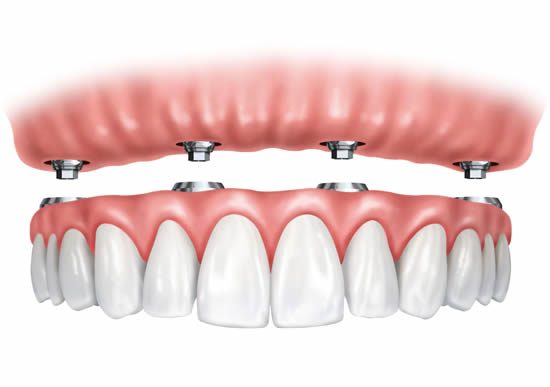Solutions For Poor Denture Stability

Loose and uncomfortable dentures can be problematic. We look at potential solutions and alternatives.
Almost everyone will have seen a cartoon or comedy sketch where someone sneezes and their dentures fly from their mouth. While this is very rare, it does indicate the extreme end of a not altogether uncommon problem that some denture wearers suffer from; namely dentures that move around in the mouth.
At its worst, this can be embarrassing in social circles, especially when the denture movement is visible or it significantly affects speech. Even without this though, it can cause difficulties when eating and also soreness of the gums due to the friction between them and the dentures.
In today’s blog, we will take a look at some of the options available to patients of Blue Sky Dental in Chelmsford which we hope will help you explore ways to achieve better denture stability and avoid these issues.
Why do dentures become loose?
It should be said that not every wearer suffers from denture movement. For some people, they work well and few problems are experienced. Others though might find, as time goes on, that the secure dentures they once had and trusted, have started to move around. In most cases, patients tend to blame the dentures, or false teeth as they are sometimes called, but this is rarely the cause of the problem.
One key reason why this happens is that tooth loss causes bone in that area to be reabsorbed by the body so that the minerals can be used elsewhere. This means that the mouth changes shape slightly. This is accentuated of course, if several teeth are missing. Dentures that once fitted well, now don’t adapt as well to the new shape, and consequently become more unstable, with the problems we have already mentioned. If you notice this happening, it is advisable to consult your dentist as soon as possible to see if any adjustments can be made which will help. In many cases though, other options may be more beneficial.
Denture adhesive
Even though ‘false teeth’ won’t decay, it is still good practice to look after them, and your gums too. Good quality cleaning will help with this. Gum disease can cause bone loss so making sure to keep the gums clean, both generally and where teeth are missing is good practice as well. One simple method that you can use to try to stabilise your dentures is to use an adhesive designed for this purpose. Make sure to buy a reputable brand, and, at least in the earlier stages of movement, this is likely to be of some help.
It will also help if your dentures are of good quality and you can discuss this with our Chelmsford prosthodontist who will be able to offer advice.
Denture stabilisation
For patients who are tired of constantly applying adhesive or who find it messy, or who would generally like to consider alternative options, there are other solutions available.
One of these is to have your dentures stabilised using dental implants. This will require some minor surgery and involves the placing of a few implants into the jawbone. These are then used to hold your dentures firmly in place. This is an excellent solution to the problem, and, with good care, the implants can last for twenty years or more and so should mean far less visits to the dentist for adjustments or for denture repairs.
This is a good solution for many patients, but you could also swap dentures for implants altogether.
Dental implants
You will initially need to have a consultation with the implant dentist to discuss the best solution. While teeth implants do require some surgery, it is a one off procedure that provides long lasting results.
Dental implants can be placed either to replace a single missing tooth, but also a number of consecutive missing teeth or even a full arch. In the case of individual implants, an ‘artificial tooth root’ will be placed and allowed to fuse with the bone in the jaw. Once this is complete, a crown will be attached, leaving you with a realistic looking replacement tooth that is also strong and secure in the mouth.
Multiple consecutive teeth don’t necessarily have to be replaced individually and a few implants can be placed to support a fixed bridge of teeth of the relevant number. For those with full arch dentures, usually between four and six titanium implants can be placed at strategic points of the jaw and these can be used to secure a full arch fixed bridge of teeth securely in place.
While dentures do still have a role to play in modern dentistry, especially given the improvements made over the years, there are good reasons why more and more people are turning to implants instead.
If you have missing teeth and would like to discuss the options available to you, you can do so by booking an initial consultation at Blue Sky Dental by calling us on 01245 211070.

Leave a Reply
You must be logged in to post a comment.